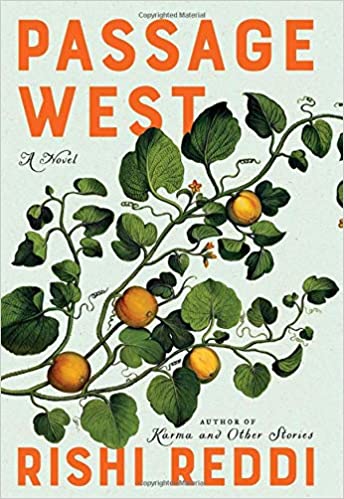Passage West by Rishi Reddi
What's It About?
“There is no room in this country for hyphenated Americanism.” — Theodore Roosevelt, 1915I love a richly layered historical novel that tells the stories of ordinary people living in extraordinary times, and Rishi Reddi’s Passage West (Ecco) does not disappoint.
AN EXTRAORDINARY TALE OF THE ORDINARY
Unlike many who “thought they did not have stories to tell,” Ram Singh, the book’s main character, shares his unforgettable tale. The story opens in 1974 as an aging Ram visits his lifelong friend and nemesis, Karak Singh Gill, who is dying in a Los Angeles hospital. At Karak’s request, Ram retrieves a box containing his own hand-written letters that Karak has saved for fifty years. Ram reads the letters and reflects on his complicated relationship with Karak, bringing us to the main portion of the story that is set between 1913 and 1924.
Reddi humanizes the past in a sweeping saga that illuminates a little known period of U.S. history at the onset of World War I. In 1914, twenty-one-year old Ram arrives in Fredonia, a city in California’s Imperial Valley, ironically hyped as “America’s Dream.” Sent by his uncle to earn money for the family, Ram leaves his wife and reluctantly joins Karak and fellow Punjabis. “There is a place for us here,” Jivan Singh Gill, Karak’s patron, tells Ram. The Hindustanees, along with other immigrant groups from every continent, all hope to better their lives by farming the Valley’s fertile agricultural land.
A STORY THAT TACKLES PREJUDICE TOWARDS IMMIGRANTS
In the Valley, “everyone had come from somewhere else;” yet, not all immigrants are welcome or extended the same privileges. Such inequities trigger resentment and bigotry between members of different immigrant groups. The American government does not allow Punjabi wives and children to come, but the European families are welcome. Furthermore, many men like Karak, encounter a legal barrier forbidding them to marry women of another race.
Perhaps the heaviest toll comes with the passing of the Alien Land Law where Asian Indians, Japanese and other non-whites are considered “aliens ineligible for citizenship,” and thereby prohibited from leasing and owning land. In every region where Punjabis farmed, there was a pattern of prejudice against them, even before the Alien Land Law was in effect.
“Who belongs in what place on this earth?” ponders Jivan Singh, a sentiment shared by Ram who longs to return home. Despite his yearning, Ram dutifully agrees to extend his stay in California, earning additional money for his cousin’s dowry in Punjab. “Home loomed beyond his reach as a place of peace, the Valley as a place of division.” Locals openly refer to the Punjabis as “dirty ragheads” and see them as a threat to family life. Large landowners who formerly negotiated monetary deals with the immigrant sharecroppers double-cross Ram and Karak by seizing their crops. Tensions mount until an unspeakable act occurs. As an old man looking back, Ram realizes how “a moment determines a life.”
HISTORICAL FICTION COMMENTING ON OUR POLITICAL PRESENT
Reddi is a meticulous researcher, history buff and, like her character Ram, a fascinating storyteller. She skillfully embeds the ubiquitous bigotry of the time in her narrative. Although the novel provides readers with a detailed view of our nation’s past indignities, the book’s themes of racism, discrimination and anti-immigration, disconcertingly resemble the divisiveness of the United States today.
Historical fiction begs readers to ask themselves, “What can we learn from our past mistakes and how can we use this knowledge to address contemporary issues?” That remains the 50 million dollar question.





